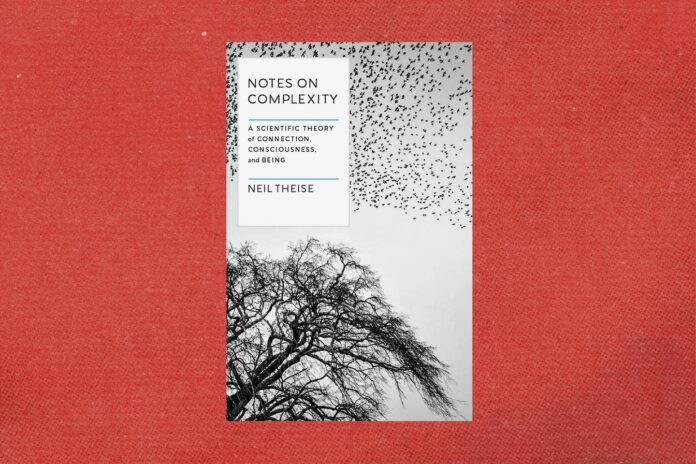Into this crowded pantheon comes “Notes on Complexity: A Scientific Theory of Connection, Consciousness, and Being,” by pathologist and stem cell biologist Neil Theise. A professor at New York University’s Grossman School of Medicine, Theise’s academic publications include citations about the liver and intrahepatic microbes, and a pathologist’s view of hepatic stem cells and cancers. (He also brings to this conversation his decades of experience as a student of Buddhism, and a college double major in Judaic studies and computer science.) In 2018, he and some colleagues published a widely discussed study in Scientific Reports. It concerned a vast system of fluid-filled pathways throughout the human body that they called the “interstitium,” which they described as “an organ in its own right,” with major potential implications for how diseases spread throughout the body. In some ways, the interstitium can be viewed as a small example of “complexity theory,” which is the organizing principle in his book. It’s a theory that attempts to provide rigorous scientific underpinnings to timeless questions of consciousness, being and self — as well as our place not just in the world but the universe.
What is complexity? One thing that it’s not, Theise assures us, is a synonym for the adjective “complicated.” Instead, it’s “the study of how complex systems manifest in the world … a class of patterns of interactions: open-ended, evolving, unpredictable, yet adaptive and self-sustaining.” Put it all together and we gain some understanding for “how life self-organizes from the substance of our universe, from interactions within the quantum foam to the formation of atoms and molecules, cells, human beings, social structures, ecosystems, and beyond.” Complexity theory addresses the vast interlocking systems, from ant hills to nations, that could be seen as autonomous, but whose interdependence becomes more astonishing the closer you look. As this sort of attention demonstrates, many of the boundaries we take for granted are not just scientifically artificial, but intellectually, spiritually and even psychologically suffocating.
At this point I should declare myself. My cast of mind has always more comfortably inhabited the world of words, history and literature than the baffling universe of numbers and abstractions that is at the heart of this book. But Theise is a conscientious teacher, and makes sure we are armed with all the necessary empirical concepts for better understanding. As he guides us through the three rather intimidating-sounding sections of the book — “Complexity,” “Complementarity and Holarchy” and “Consciousness” — his explanations are so lucid and accessible, the illustrations so on point, that I (almost) forgot to be alarmed by his references to cell biology, string theory, axioms, theorems and even quantum mechanics (about which Theise quotes Richard Feynman, who said: “I think I can safely say that nobody understands quantum mechanics.” Roger that.)
The literature of mindfulness is full of entreaties to contemplate our vast interconnectedness. But such appeals ask a lot from those of us who are products of the thoroughly atomized, self-involved, Western world — with bills to pay, screens to obsess over and dogs to walk. As Theise observes, “Casual generalizations about how we are all ‘one with the universe’ are so common these days as to be trite. However easy it might be to thoughtlessly repeat that banal truism, though, it is in fact exceedingly difficult to intuit it directly, as a physical experience, not merely a belief.”
But even if Theise concludes that the end state of all this complexity is, inevitably, chaos, the constantly regenerative nature of complexity still offers something like hope. As Theise writes, perhaps too optimistically but very reassuringly: “Complexity comforts us, revealing, unequivocally, unavoidably, that however separate and alone we might feel, each one of us is — in each and every single moment — a pure expression of the entire living, conscious universe. Nothing separate, nothing left out, but true, pure, and complete, just as we are.” The sheer density of Theise’s insights occasionally makes them difficult to parse, but time spent reading this slender work offers a compelling retreat into the exhilarating and oddly reassuring world of complexity.
A Scientific Theory of Connection, Consciousness, and Being
Spiegel and Grau. 205 pp. $27
A note to our readers
We are a participant in the Amazon Services LLC Associates Program,
an affiliate advertising program designed to provide a means for us to earn fees by linking
to Amazon.com and affiliated sites.



